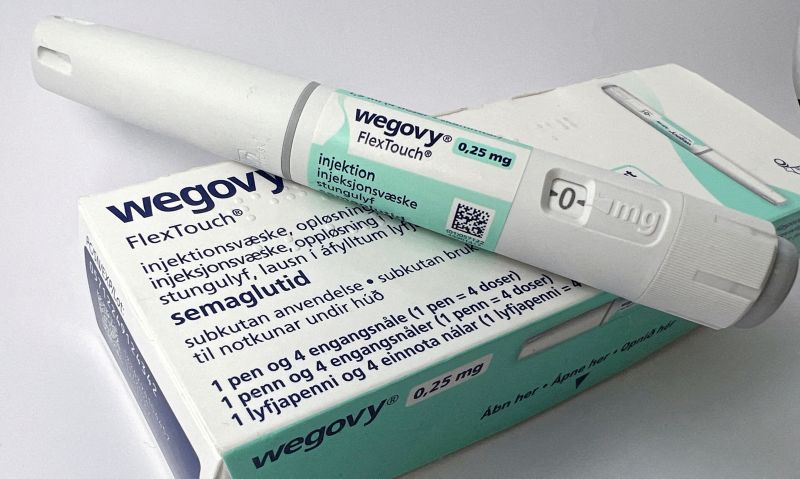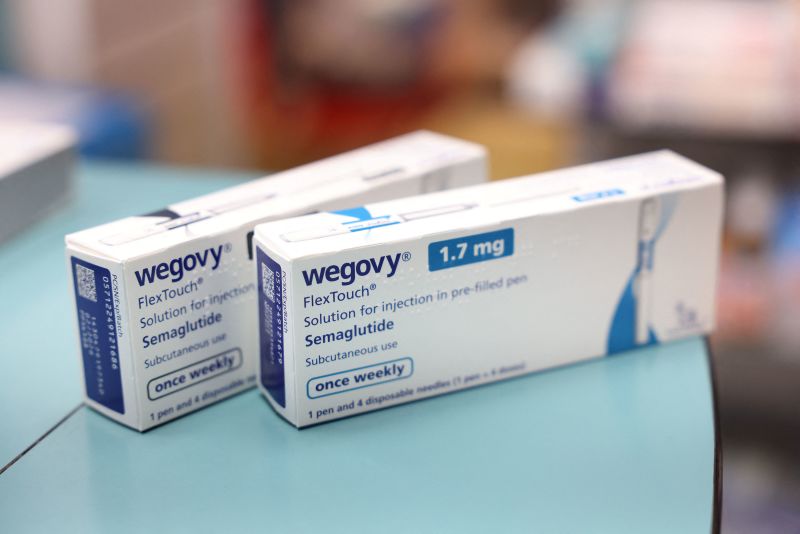
Insights from Wegovy's Extended Clinical Trial: Weight Loss, Side Effects, and Heart Health

Recent insights from an extended clinical trial of the weight-loss medication Wegovy reveal the speed of weight loss, the duration of maintained weight loss, and the safety profile over a four-year period. Learn more about the effectiveness, side effects, and heart protection benefits of Wegovy based on the latest analyses.
New findings from the most extensive clinical trial of the weight-loss medication Wegovy reveal valuable insights into its effectiveness, duration of weight loss, and safety over a four-year period.
A 0.25 mg injection pen of Wegovy, a weight-loss drug made by Novo Nordisk, is shown in this photo illustration in Oslo, Norway, on September 1, 2023.
A 0.25 mg injection pen of Wegovy, a weight-loss drug made by Novo Nordisk, is shown in this photo illustration in Oslo, Norway, on September 1, 2023.
Victoria Klesty/Reuters
Related article
At least 25,000 people in the US are starting weight-loss drug Wegovy each week, drugmaker says
The analyses of the trial Select revealed that Wegovy not only helps with weight loss but also significantly reduces heart risk. Researchers mentioned that the drug may have additional heart-protective effects beyond just weight loss. This raises new questions about how popular drugs in this class should be used and covered by insurers.
Dr. Harlan Krumholz, a cardiologist and scientist at Yale University and Yale New Haven Hospital, commented on the findings. He stated that the implications are significant, especially since another study this week also showed similar heart benefits for heart failure. According to Dr. Krumholz, the breadth of heart benefits seen with Wegovy is unprecedented in the drug world.
More than 25,000 people in the US are starting Wegovy every week, as announced by drugmaker Novo Nordisk. According to a recent KFF poll, 6% of respondents reported currently using drugs in the GLP-1 receptor agonist class, totaling over 15 million Americans.
One crucial aspect to consider with these popular medications is the extent and duration of their research. The Select trial, sponsored by Novo Nordisk, demonstrated last year that Wegovy reduced the risk of heart attack, stroke, or heart-related death by 20% in individuals with existing cardiovascular risk due to obesity or being overweight. This study involved over 17,600 participants from 41 countries over the period of 2018 to 2021, with follow-up for several years.
Researchers have been analyzing the data further and the latest findings, shared at the European Congress on Obesity and published in Nature Medicine, reveal the outcomes of individuals using Wegovy for up to four years. One key finding is:
People experienced ongoing weight loss for over a year.
The analysis revealed that individuals who used semaglutide, the active ingredient in Wegovy, experienced an average weight loss of just over 10%, in contrast to a 1.5% weight loss for those who received a placebo. Dr. Donna Ryan from Pennington Biomedical Research Center in Baton Rouge, Louisiana, led the research team and observed that participants typically continued to lose weight for approximately 65 weeks, equivalent to a year and three months, before reaching a plateau.
In a previous clinical trial, Wegovy demonstrated an even higher average weight loss of about 15% over 68 weeks, compared to a 2.4% weight loss for those who received a placebo. The researchers conducting the new analysis pointed out that aside from variations in the participants of each trial, the previous study was specifically focused on weight loss and incorporated more structured lifestyle interventions regarding diet and exercise, unlike the Select trial which aimed to determine the drug's effectiveness in preventing cardiac events.
It was sustained for up to four years
The results showed that the 10% average weight loss for people using Wegovy was sustained for up to 208 weeks, or four years.
Patients who stayed on the medication were able to maintain their weight loss. In a recent study by Eli Lilly, participants using the GLP-1 drug Zepbound, which contains tirzepatide and targets a hormone called GIP, lost an average of 21% of their body weight over 36 weeks. After being split into two groups, those who stayed on the medication lost an additional 5.5% of their body weight, while those who switched to a placebo unknowingly regained 14% of their weight.
However, not everyone regained the weight they lost. The study also found that nearly 90% of those who continued on the drug were able to maintain at least 80% of their weight loss after 36 weeks. On the other hand, almost 17% of the participants who were switched to a placebo were able to maintain that much weight loss without the drug.
Results can vary for each individual. In a recent study, researchers found that after two years, around 68% of those taking Wegovy had lost at least 5% of their body weight, compared to only 21% of those on a placebo. Additionally, nearly 23% of Wegovy users had lost at least 15% of their body weight, in contrast to 1.7% of those on a placebo. Furthermore, almost 5% of individuals on Wegovy had lost more than 25% of their body weight, while only 0.1% of those on placebo had. This goes to show that the results of studies are just averages, as each person's experience with medications can differ.
No unexpected safety issues up to four years.
Overall, more participants taking Wegovy chose to discontinue the trial due to side effects compared to those on a placebo. Specifically, 17% experienced side effects on the drug compared to 8% on the placebo, as previously reported. The side effects were commonly gastrointestinal disorders such as nausea, diarrhea, vomiting, and constipation, typically occurring in the initial months of the study as the medication dosage was increased.
The latest analyses showed that there were no new safety concerns identified by the researchers. Acute pancreatitis, which is inflammation of the pancreas, did not occur more frequently in those taking Wegovy compared to those taking a placebo. However, gallbladder disorders such as gallstones were slightly higher in the Wegovy group at 2.8% compared to 2.3% in the placebo group. These side effects were already known and are mentioned in the drug's prescribing information due to previous trial findings.
Additionally, there are other benefits associated with using Wegovy beyond just weight loss.
When the full results of the Select trial were first revealed, a crucial question arose: was the 20% decrease in heart risk solely due to weight loss, or was there another beneficial effect of the drug? The latest analysis indicates that there may be another factor contributing to this reduction.
This is evident from the fact that even individuals who did not experience weight loss while using Wegovy still demonstrated a decreased risk of heart attack or other related events.
Boxes of Wegovy made by Novo Nordisk are seen at a pharmacy in London, Britain March 8, 2024. REUTERS/Hollie Adams
Boxes of Wegovy made by Novo Nordisk are seen at a pharmacy in London, Britain March 8, 2024. REUTERS/Hollie Adams
Hollie Adams/Reuters
Related article
Weight-loss drug Wegovy has been found to offer benefits for individuals with diabetes and a common form of heart failure, according to a recent study.
Dr. Daniel Drucker, a leading researcher in GLP-1 at the University of Toronto, mentioned that you may not even need to lose weight to experience the cardiovascular benefits of semaglutide and similar medications. He emphasized that GLP-1 is known to be cardio-protective in animals, regardless of whether the individual has diabetes or obesity. Weight loss is not always necessary to see these positive effects.
John Deanfield from University College London conducted a study which showed that the decrease in major adverse cardiovascular events among those taking Wegovy was similar regardless of whether they lost 5% or more of their body weight, lost less than that, or even gained weight.
The researchers concluded that there may be other factors besides weight loss that contribute to the improved cardiovascular outcomes seen in the study.
A new study released on Monday focused on heart failure, a condition where Wegovy has been found to provide significant advantages, according to Krumholz.
In an email, he mentioned, "These two studies indicate that these anti-obesity medications can also benefit heart health. The positive effects on the heart are observed in individuals with existing cardiovascular issues or a specific form of heart failure, irrespective of the extent of weight reduction."
A benefit from reducing inflammation
Drucker suspects that GLP-1 drugs provide these kinds of benefits by reducing inflammation.
"He mentioned that we can't overlook the decrease in blood pressure or triglycerides, and the weight loss and improved glucose levels should also have some positive impact," he explained.
However, he shared that based on the research conducted in his lab, "one theory that I particularly favor is inflammation, as we are aware that individuals with heart disease tend to have higher levels of inflammation in their blood vessels and heart."
Get CNN Health's weekly newsletter
Sign up here to get The Results Are In with Dr. Sanjay Gupta every Tuesday from the CNN Health team.
Studies have shown that GLP-1 drugs can reduce harmful inflammation, a topic Drucker's lab is currently researching. He has received feedback from individuals with conditions such as Covid-related brain fog, ulcerative colitis, and arthritis - all conditions driven by inflammation - who believe their symptoms have improved while using GLP-1 medications. However, these connections would require further validation through clinical studies.
Drucker mentioned that the results of the Select trial have raised an important question: Can individuals who do not have obesity or are not overweight, but have experienced a heart attack or stroke, benefit from taking a drug like Wegovy to prevent another event? This is another aspect that would need to be explored in research studies.
Drucker suggested that insurers should expand coverage for expensive medicines, which can cost $1,000 or more per month. He believes that current reimbursement criteria may not be effective in improving health outcomes or saving healthcare costs. According to Drucker, even without weight loss, these medicines can reduce the risk of heart attacks, strokes, and death.
Editor's P/S:
The findings from the extended clinical trial of Wegovy provide valuable insights into its long-term effectiveness, safety, and potential benefits beyond weight loss. The sustained weight loss for over a year and the maintenance of weight loss for up to four years are remarkable achievements. Notably, the reduction in heart risk, even among those who did not experience weight loss, suggests additional cardio-protective effects of the drug, which may be related to reduced inflammation.
These findings raise important questions regarding the appropriate use and coverage of Wegovy. Insurers should consider expanding coverage to include individuals at risk of heart disease, even if they are not overweight or obese. Further research is needed to explore the potential benefits of Wegovy in preventing cardiovascular events in this population. Additionally, the study highlights the need for a broader understanding of the mechanisms by which GLP-1 drugs exert their cardio-protective effects, opening up new avenues for research and therapeutic interventions.















